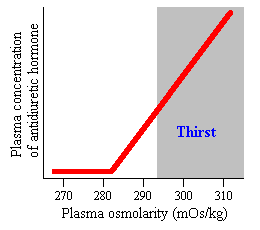VIVO Pathophysiology
Antidiuretic Hormone
Roughly 60% of the mass of the body is water, and despite wide variation in the amount of water taken in each day, body water content remains incredibly stable. Such precise control of body water and solute concentrations is a function of several hormones acting on both the kidneys and vascular system, but there is no doubt that antidiuretic hormone is a key player in this process.
Antidiuretic hormone, also known commonly as arginine vasopressin, is a nine amino acid peptide secreted from the posterior pituitary. Within hypothalamic neurons, the hormone is packaged in secretory vesicles with a carrier protein called neurophysin, and both are released upon hormone secretion.
Physiologic Effects of Antidiuretic Hormone
Effects on the Kidney
The single most important effect of antidiuretic hormone is to conserve body water by reducing the loss of water in urine. A diuretic is an agent that increases the rate of urine formation. Injection of small amounts of antidiuretic hormone into a person or animal results in antidiuresis or decreased formation of urine, and the hormone was named for this effect.

Antidiuretic hormone binds to receptors on cells in the collecting ducts of the kidney and promotes reabsorption of water back into the circulation. In the absense of antidiuretic hormone, the collecting ducts are virtually impermiable to water, and it flows out as urine.
Antidiuretic hormone stimulates water reabsorbtion by stimulating insertion of "water channels" or aquaporins into the membranes of kidney tubules. These channels transport solute-free water through tubular cells and back into blood, leading to a decrease in plasma osmolarity and an increase osmolarity of urine.
Effects on the Vascular System
In many species, high concentrations of antidiuretic hormone cause widespread constriction of arterioles, which leads to increased arterial pressure. It was for this effect that the name vasopressin was coined. In healthy humans, antidiuretic hormone has minimal pressor effects.
Control of Antidiuretic Hormone Secretion
The most important variable regulating antidiuretic hormone secretion is plasma osmolarity, or the concentration of solutes in blood. Osmolarity is sensed in the hypothalamus by neurons known as an osmoreceptors, and those neurons, in turn, stimulate secretion from the neurons that produce antidiuretic hormone.
When plasma osmolarity is below a certain threshold, the osmoreceptors are not activated and secretio of antidiuretic hormone is suppressed. When osmolarity increases above the threshold, the ever-alert osmoreceptors recognize this as their cue to stimulate the neurons that secrete antidiuretic hormone. As seen the the figure below, antidiuretic hormone concentrations rise steeply and linearly with increasing plasma osmolarity.
Osmotic control of antidiuretic hormone secretion makes perfect sense. Imagine walking across a desert: the sun is beating down and you begin to lose a considerable amount of body water through sweating. Loss of water results in concentration of blood solutes - plasma osmolarity increases. Should you increase urine production in such a situation? Clearly not. Rather, antidiuretic hormone is secreted, allowing almost all the water that would be lost in urine to be reabsorbed and conserved.

There is an interesting parallel between antidiuretic hormone secretion and thirst. Both phenomena appear to be stimulated by hypothalamic osmoreceptors, although probably not the same ones. The osmotic threshold for antidiuretic hormone secretion is considerably lower than for thirst, as if the hypothalamus is saying "Let's not bother him by invoking thirst unless the situation is bad enough that antidiuretic hormone cannot handle it alone."
Secretion of antidiuretic hormone is also stimulated by decreases in blood pressure and volume, conditions sensed by stretch receptors in the heart and large arteries. Changes in blood pressure and volume are not nearly as sensitive a stimulator as increased osmolarity, but are nonetheless potent in severe conditions. For example, Loss of 15 or 20% of blood volume by hemorrhage results in massive secretion of antidiuretic hormone.
Another potent stimulus of antidiuretic hormone is nausea and vomiting, both of which are controlled by regions in the brain with links to the hypothalamus.
Disease States
The most common disease of man and animals related to antidiuretic hormone is diabetes insipidus. This condition can arise from either of two situations:
- Hypothalamic ("central") diabetes insipidus results from a deficiency in secretion of antidiuretic hormone from the posterior pituitary. Causes of this disease include head trauma, and infections or tumors involving the hypothalamus.
- Nephrogenic diabetes insipidus occurs when the kidney is unable to respond to antidiuretic hormone. Most commonly, this results from some type of renal disease, but mutations in the ADH receptor gene or in the gene encoding aquaporin-2 have also been demonstrated in affected humans.
The major sign of either type of diabetes insipidus is excessive urine production. Some human patients produce as much as 16 liters of urine per day! If adequate water is available for consumption, the disease is rarely life-threatening, but withholding water can be very dangerous. Hypothalamic diabetes insipidus can be treated with exogenous antidiuretic hormone.
Updated 2018. Send comments to Richard.Bowen@colostate.edu
A Bosnian translation of this page by Amina Dugalic is available at Bosnian Translation
A Finnish translation of this page by Elsa Jansson is available at Finnish translation
A Ukrainian translation of this page by Olena Chervona is available at Ukrainian Translation

